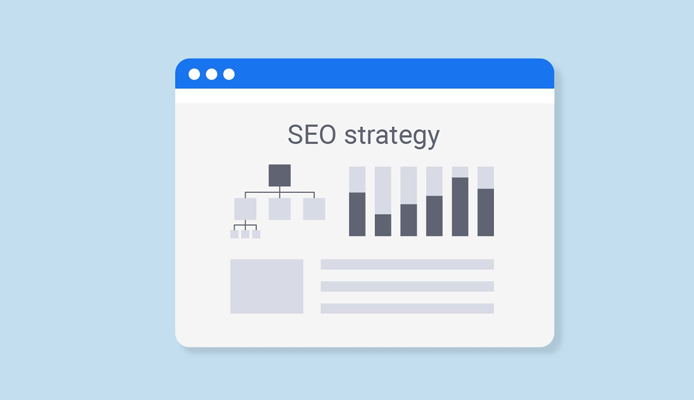How do I know which keywords work for my business?
To choose the right keywords for your business website to target, you are going to have to do some keyword research.
Keyword research allows you to identify the phrases that your target audience are searching online. It’s more than that though. Thorough keyword research involves:
- identifying searcher intentions
- identifying keywords and phrases
- analysing search difficulty and number of searches
- competitor analysis
- curating landing pages
With a good SEO strategy, your small business can easily compete with globally recognised brands for the top spot in SERPs.
Defining a Good SEO Strategy
But a good SEO strategy is hard to define. Many people claim to know the secret to bagging the top spot. Most of these people don’t know what they’re talking about or will try to convince you to implement a black-hat SEO strategy that will likely lead to penalisation.
When it comes to SEO, honesty is the best policy.
It all comes down to good website design. Any attempt at cheating the system will get debunked. Your website will lose all organic traffic for some time, if not forever.
This is one of the reasons that I put so much emphasis on keyword targeting. And not just any keywords, that could be just as harmful as a black-hat SEO strategy.
You have to target the right keywords for your business and your audience. You have to provide a result to that query that fills the purpose of the search. Content is king, keyword research is his crown.
What is Keyword Research and Targeting?
Keyword research helps you better target the words or phrases related to your business. Good keyword research will make sure your website is always on the first page when somebody searches for that query.
Targeting the right keywords will ensure that search engines serve your content to the right people. You can go a step further than that though.
Are you trying to sell a product? Educate people? Do you want more people to sign up to your mailing list?
Choosing the right keywords for your business will not only grow your organic traffic, but it will also increase conversions and help you grow.
Articulate Marketing state targeting the right keywords will help your ideal customers find you. They listed keyword targeting in their 11 top SEO tips.
Defining your Business’ Keywords
A lot of time should be given at conducting keyword research.
When I say a lot of time, I mean it. I spend twice the amount of time conducting research into keywords and content options than I do writing content.
My approach has proven successful and my company continue to rank for more keywords, increasing organic traffic, month on month.
The first thing I had to do when I took on this responsibility was define my businesses keywords. Seems simple enough. Until I looked into the details:
- ‘Exhibition stands’ is an umbrella term for hundreds of products with varying costs, designs, styles and exhibiting solutions
- A search this loosely defined doesn’t suggest that the searcher is in the market for an exhibition stand yet, perhaps they are looking for ideas or information
- There is a lot of competition for this keyword, making it more difficult to rank in SERP’s
A more sensible idea would be to target a keyword specific to our niche. I could write content targeting several keywords and phrases that would help people discover the product range and find information about upcoming exhibitions.
A keyword doesn’t have to be one or two words; it can be an entire phrase, preposition or question.
Rather than ‘exhibition stands’, here are some keywords that an exihibition design agency can target.
Understanding Search Intent
If someone is searching for a specific phrase relating to your product, you want to make sure that the searcher knows that that is what you do.
The searcher has shown their intention to find out more about “modular exhibition stands” or find a company that provides “flooring for exhibition stands”.
Prepositions and questions are typically a sign that a user is searching for information. If you were searching for ways to find the right keywords for your business, it wouldn’t be useful to show you SEO agencies or digital marketing companies.
Search engines know this. The content that ranks for the keywords you choose to target rely heavily upon search intent.
The Problem with Vague Keywords
When someone searches for a vague or loosely defined keyword, search engines aren’t able to pinpoint their intention. Are they looking for information, a particular brand, make a purchase or research products for a future purchase?
Someone who searches for “exhibition stands” may have a trade show next month and need to make a purchase there and then. They may be a student studying marketing who has just come across the term and wants to know what it means. Or they could be looking for design ideas so that they can start planning for an event next year.
To really understand search intent, look at the difference in results when you search for “dog” vs. “dog walker”.
user experience and Keyword Targeting
Unless you know searcher intention, you can’t develop a landing page that suits their need.
User experience is becoming more important for SEO. The search engines take bounce rate into account when indexing a web page.
Bounce rate is a measurement of how many people leave a website after viewing just one page. It suggests that the content you are showing is irrelevant, there are issues with your site or doesn’t fulfil the searcher’s intention of the keyword.
It’s bad for your SEO, bad for your customers and bad for your business. Yet, thousands of businesses worldwide battle for these lucrative keywords. Why? Search volume.
In the table below, you will see why so many businesses targeted loose or vague keywords rather than the more niche phrases we discussed earlier.
| Keyword | Search Volume | Search Difficulty |
|---|---|---|
| Exhibition Stands | 2,900 | 49 |
| Modular Exhibition Stands | 320 | 29 |
| Exhibition Planning Template | 10 | 17 |
As you can see, the keyword “exhibition stands” has a much higher search volume than the more targeted “modular exhibition stands”. That means more people search for that phrase each month than any other keywords on the table.
It also has higher search difficulty. That means that there is more competition amongst other websites (their direct competitors) to rank for that keyword. And remember, we are still uncertain of the searcher’s intention.
Now, do you want to work extremely hard to try to rank for a keyword that could increase organic traffic but won’t necessarily benefit your business or drive conversions? Or do you want to do target the right keywords for your business every time?
I have noticed that the search results for vague keywords often show eCommerce sites and Pinterest boards. This suggests that search engines has decided that the searcher intention is to find ideas or buy that product.
That’s why I chose to focus my off-page SEO and content marketing strategy on long-tail keywords. According to Raven Tools, 70% of search traffic comes from long-tail keywords. They make up the majority of searches. But do you know what they are?
Fat Heads, Chunky Middles and Long Tails
A long-tail keyword is a search phrase with a longer word count. How did you find this article? Did you search for “keyword research” or “what keywords should I use for my business”? Long-tail keywords tend to have a lower search volume but are also much easier to rank for.
More than two-thirds of searches come from long-tail keywords that have a higher specificity. Looking at the chart below gives you a good idea of how we can breakdown online queries.
Fat head keywords are made up of 1 – 2 words and have the highest search volume. They are notoriously difficult to rank for and have the highest competition levels. In our case study example, the fat head keyword would be “exhibition stands”. As we have already discussed, search engines find it harder to identify search intent with fat head keywords.
The chunky middle keywords are great to target if you sell a niche product or service. Think “white-hat SEO agency” as opposed to the fat head “SEO agency”. If your business can deliver a user experience that matches the search intent of this query, these are the keywords you should aim to rank for.
However, just because you’ve found a chunky middle phrase that relates to your business doesn’t mean you should target that keyword.
Remember, if your content doesn’t provide a valuable user experience then you will never make it onto the SERP’s. Make sure that your content answers the query in accordance with search intent.
What is a Long-Tail Keyword?
This is why most SEO agencies, independent experts and marketing managers choose to target long-tail keywords. These are much longer phrases that get few searches per month but have low competition, clearly identify search intent and account for 70% of online queries.
If “exhibition stands” is my fat head and “modular exhibition stands” is my chunky middle, what long-tail keywords should I target?
Keyword Trends
Once you have your head around search intent, user experience and long-tail keywords you can finally start to identify which phrases you should target for your business. But how do you know which keywords to target in the first place?
The first thing you want to do is analyse the search volume. Even if you target the most obscure long-tail phrases, you want your keyword to get some searches a month, otherwise, your efforts are pointless.
Luckily, there are loads of free tools available for marketers and business owners that can tell you just that. Google trends and keyword planner are great places to start. Check out Backlinko’s list of the 15 best keyword research tools!
They will tell you how many searches a word or phrase gets and give you a breakdown of geographic data. Ubersuggest is a personal favourite. Not only does it give search volume but you will also get a list of suggested alternatives and search difficulty so you can choose the keywords with the least competition.
Choosing the right long-tail keywords for your business
Now you are at the stage where you can choose the long-tail keywords that your business should target
Look at what questions people are asking about your business or the industry you operate in. I would look at queries about exhibitions. Then make a list of all of the long-tail phrases that had more than ten searches a month.
Adopt a content marketing strategy that aims to create the perfect landing page, remember user experience, for each of these long-tail keywords.
Creating a Content Calendar
Once you have a list of your long-tail keywords, you can curate your content calendar. Aim to create weekly blog posts that answer long-tail search questions. Follow SEO best practice when writing and try your hand at social media marketing to get the article out there.
Don’t just include new content on this calendar. Dedicate some time each week to update and refresh the existing content on your site. In doing so you can optimise the work you have already done to target the right keywords and align with your content marketing strategy.
Most importantly, never stop researching and updating. Trending keywords will change overtime. Often they are seasonal. That means you might have to adapt your calendar and think on your feet to target certain long-tail phrases.
This keyword targeting strategy will grow your organic traffic. Despite having low search volume, you can dramatically increase your rankings after a few months of targeting long-tail keywords.
It’s not the huge search volume that you got excited about with the vague term. However, the longer you use this strategy the more long-tail keywords you can target.
Eventually you will have answers to all the top queries about your industry. And then leads will fall on your lap.
Summary
If you run a small or niche business, you might not have a clue where to start when it comes to SEO and keyword targeting. Hopefully, this article has helped you understand the best strategy for moving forward.
The first thing you need to do is identify a handful of keywords and understand what the search intent behind each one is.
As you now know, there is no point writing a blog post if the search intent reveals they want to make a purchase. If it’s not obvious straight away, have a look at some of the other ranking pages – are these all informative articles or eCommerce sites? That will tell you what type of content you want to product to improve your chances of ranking for that particular phrase.
Then you need to do your keyword research. Start with the fat head phrase associated with your industry and narrow it down until you get a couple of chunky middle terms and a good number of long-tail keywords. Make sure that all of these keywords get at least ten searches a month; otherwise, they aren’t doing anything for your business.
Finally, update the content already on your site to align itself with your new targeted keywords and the searcher intent. This is how you master content marketing for any small business.
Improve the user experience by answering the query right off the bat. Use bullet points, bold text and relevant headers to make this clear to the reader. Once you’re existing content is up to scratch, start creating content to specifically target your long-tail keywords.
It sounds so obvious now, doesn’t it? Keyword targeting is the best way to grow your organic traffic, introduce yourself to a new audience and boost your business. What are you waiting for?
Choosing the right keywords for your business is key to a successful content marketing strategy. Use this technique to grow your organic traffic in weeks!
Author Bio -
Natalka Antoniuk is an SEO Content Writer at Quadrant2Design in Poole. She uses industry expertise to teach business owners the benefits of face-to-face marketing and encourages them to step up their content marketing strategy.


























